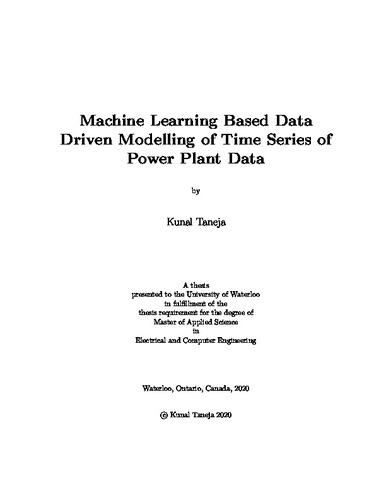| dc.contributor.author | Taneja, Kunal | |
| dc.date.accessioned | 2020-04-28 19:49:28 (GMT) | |
| dc.date.available | 2020-04-28 19:49:28 (GMT) | |
| dc.date.issued | 2020-04-28 | |
| dc.date.submitted | 2020-04-23 | |
| dc.identifier.uri | http://hdl.handle.net/10012/15792 | |
| dc.description.abstract | Accurate modeling and simulation of data collected from a power plant system are important
factors in the strategic planning and maintenance of the unit. Several non-linearities
and multivariable couplings are associated with real-world plants. Therefore, it becomes
almost impossible to model the system using conventional mathematical equations. Statistical
models such as ARIMA, ARMA are potential solutions but their linear nature cannot
very well t a system with non-linear, multivariate time series data. Recently, deep learning
methods such as Arti cial Neural Networks (ANNs) have been extensively applied for
time series forecasting. ANNs in contrast to stochastic models such as ARIMA can uncover
the non-linearities present underneath the data.
In this thesis, we analyze the real-time temperature data obtained from a nuclear power
plant, and discover the patterns and characteristics of the sensory data. Principal Component
Analysis (PCA) followed by Linear Discriminant Analysis (LDA) is used to extract
features from the time series data; k-means clustering is applied to label the data instances.
Finite state machine representation formulated from the clustered data is then used to
model the behaviour of nuclear power plants using system states and state transitions. Dependent
and independent parameters of the system are de ned based on co-relation among
themselves. Various forecasting models are then applied over multivariate time-stamped
data. We discuss thoroughly the implementation of a key architecture of neural networks,
Long Short-Term Neural Networks (LSTMs). LSTM can capture nonlinear relationships
in a dynamic system using its memory connections. This further aids them to counter
the problem of back-propagated error decay through memory blocks. Poly-regression is
applied to represent the working of the plant by de ning an association between independent
and dependent parameters. This representation is then used to forecast dependent
variates based on the observed values of independent variates. Principle of sensitivity
analysis is used for optimisation of number of parameters used for predicting. It helps in
making a compromise between number of parameters used and level of accuracy achieved
in forecasting.
The objective of this thesis is to examine the feasibility of the above-mentioned forecasting
techniques in the modeling of a complex time series of data, and predicting system
parameters such as Reactor Temperature and Linear Power based on past information. It
also carries out a comparative analysis of forecasts obtained in each approach. | en |
| dc.language.iso | en | en |
| dc.publisher | University of Waterloo | en |
| dc.subject | machine learning | en |
| dc.subject | data driven modelling | en |
| dc.subject | time series forecasting | en |
| dc.subject | neural networks | en |
| dc.subject | finite state machine | en |
| dc.subject | time series modelling | en |
| dc.subject.lcsh | Machine learning | en |
| dc.subject.lcsh | Neural networks (Computer science) | en |
| dc.subject.lcsh | Time-series analysis | en |
| dc.title | Machine Learning Based Data Driven Modelling of Time Series of Power Plant Data | en |
| dc.type | Master Thesis | en |
| dc.pending | false | |
| uws-etd.degree.department | Electrical and Computer Engineering | en |
| uws-etd.degree.discipline | Electrical and Computer Engineering | en |
| uws-etd.degree.grantor | University of Waterloo | en |
| uws-etd.degree | Master of Applied Science | en |
| uws.contributor.advisor | Naik, Kshirasagar | |
| uws.contributor.advisor | Pandey, Mahesh | |
| uws.contributor.affiliation1 | Faculty of Engineering | en |
| uws.published.city | Waterloo | en |
| uws.published.country | Canada | en |
| uws.published.province | Ontario | en |
| uws.typeOfResource | Text | en |
| uws.peerReviewStatus | Unreviewed | en |
| uws.scholarLevel | Graduate | en |

